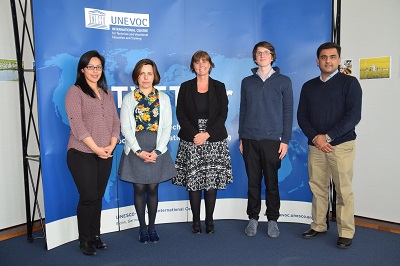
The UNESCO-UNEVOC International Centre: Who We Are | What We Do | Working With Us | Get in Touch
The UNEVOC Network: Learn About the Network | UNEVOC Network Directory
For Members: UNEVOC Centre Dashboard
Thematic Areas: Inclusion and Youth | Digital Transformation | Private Sector Engagement | SDGs and Greening TVET
Our Key Programmes & Projects: BILT: Bridging Innovation and Learning in TVET | Building TVET resilience | TVET Leadership Programme | WYSD: World Youth Skills Day
Past Activities: COVID-19 response | i-hubs project | TVET Global Forums | Virtual Conferences | YEM Knowledge Portal
Our Services & Resources: Publications | TVET Forum | TVET Country Profiles | TVETipedia Glossary | Innovative and Promising Practices | Toolkits for TVET Providers | Entrepreneurial Learning Guide
Events: Major TVET Events | UNEVOC Network News
07 April, 2016
 On 7 April 2016, Dr Mette Creaser, National Manager of Statistics and Analytics at the National Centre for Vocational Education Research (NCVER) in Australia, visited UNESCO-UNEVOC International Centre to discuss and learn about UNESCO-UNEVOC’s programmes and services, in particular, the knowledge management activities.
On 7 April 2016, Dr Mette Creaser, National Manager of Statistics and Analytics at the National Centre for Vocational Education Research (NCVER) in Australia, visited UNESCO-UNEVOC International Centre to discuss and learn about UNESCO-UNEVOC’s programmes and services, in particular, the knowledge management activities.
The NCVER has been a UNEVOC Centre since 2000 and acts as the Cluster Coordinator for the Pacific Islands cluster in the UNEVOC Network. In Australia the Centre is responsible for collecting, managing, analysing, evaluating and communicating research and statistics about technical and vocational education and training (TVET) and the wider tertiary sector.
Dr Creaser’s visit came in light of a collaborative research project undertaken by NCVER, and supported by UNESCO-UNEVOC, on return on investment (ROI) in TVET. The research aims to identify the nature of private and public economic benefits from investment in training, and understand how TVET can potentially contribute to wider social benefits including social inclusion, crime reduction and general health and wellbeing. With the support of UNESCO-UNEVOC, several countries in Asia and the Pacific through the UNEVOC network will be involved in testing the framework. Dr Creaser had the opportunity to discuss the project in detail with programme staff of UNESCO-UNEVOC, with a particular focus on the possibilities that UNEVOC’s online platforms offer to engage the wider TVET community in the discussion.